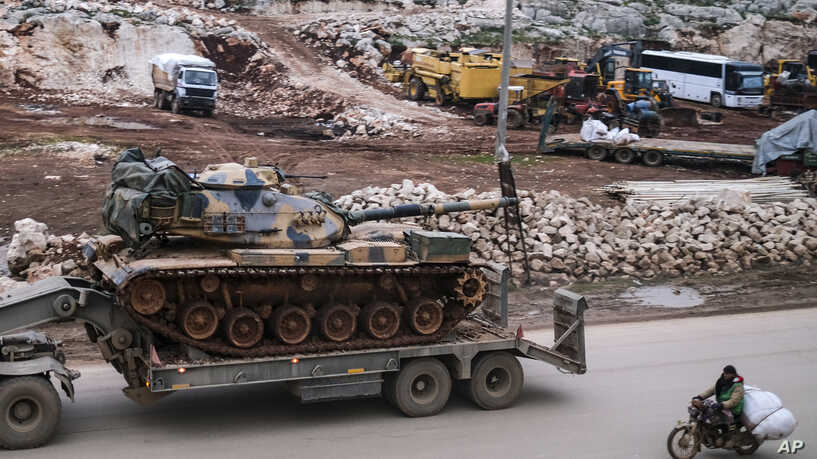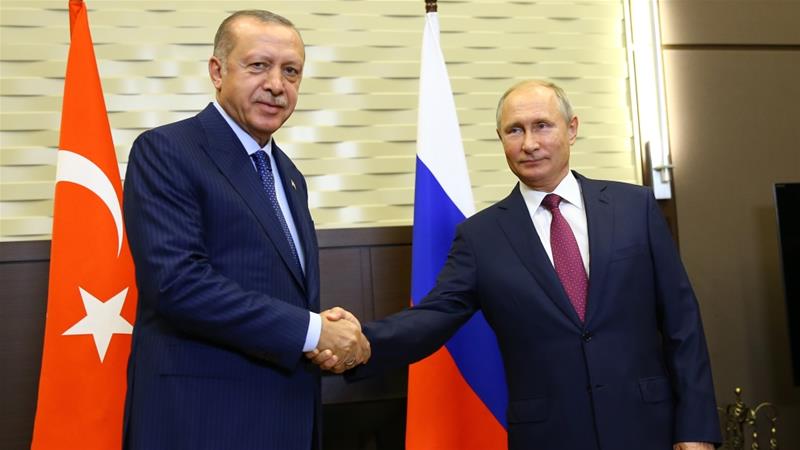
Eight school facilities bombed in Idlib province, 25th February
For the refugee crisis at the borders, see the comments boxes below the article
Text received from A.:
At the moment, the tension between Russian and Turkish troops in Syria has increased dramatically.
The participants in the conflict exchange blows. The Russian military (Russian air force and mercenaries are attacking the Syrian district of Idlib together with Assad and Pro-Iranian formations) are firing at the Turkish military. The Turks respond by using artillery and firing at Russian planes from MANPADS.
In this war, Turkey and Russia are on opposite sides of the conflict. The Russians support dictator Assad, while Erdogan supports anti-Assad jihadists and Pro-Turkish nationalists. Until recently, Russia, Turkey, Iran, and the United States somehow shared zones of influence in Syria. But recently they have had disagreements. The imperialist powers cannot agree on Idlib.
At the same time, the US has taken the side of Turkey and actively supports it in the confrontation with Russia. Although the US will not use the army against Russia, it is ready to help Turkey with supplies of intelligence and military equipment. It is not clear whether or not the “Patriot” air defense system will be delivered to Turkey, but the US envoy to Syria, James Jeffrey, is clearly pushing Turkey to war with Russia, promising the Turks American support.
Generally speaking, the ratio of forces in the region is flattering to Turkey. Turkey has a huge army, Navy, and modern air force near its bases. At the same time, Russia has a small expeditionary force at a great distance from its bases.
Turkey and Russia have fought 13 times, and Russia lost the last war with Turkey in 1914-1918.
At the same time, the probability that Russia and Turkey will agree at the expense of a “third party”, dividing the Kurdish regions of Syria, is still very high…. This is a realistic way to avoid the threat of the 14th Russian-Turkish war. But this will lead to another massacre, which the Turkish troops will arrange for the Kurds, and to the flight of hundreds of thousands of civilian Kurdish population from Kobani to Kamyshlo.
What to do in this situation? I understand that we do not have an international movement of workers, and there is no conscious proletarian force to counter the threat of war. However, in Russia, the majority (55 percent v. 33 percent) has a negative attitude to the war in Syria. So, clashes with Turkey, if they happen and if they do not work out in favor of Russia, can cause a surge of indignation in Russia.
As far as I’ve read about it, after the death of 16 Turkish soldiers in Syria (they fell after the blows of Assad and Russian forces), Turkish public opinion was radicalized and perhaps most Turks would support revenge. However, I have not seen the data of opinion polls in Turkey in recent days. It is known that ¾ of Turks support Erdogan’s anti-Kurdish operations in the border zone of Syria.
So, unfortunately, Russia and Turkey are on the verge of war, and for our two countries, such wars are an ancient and glorious custom. Usually tens or hundreds of thousands of people died each time on both sides, and in addition, these wars are usually accompanied by genocide.
Few people know that the Armenian genocide, which was organized by the Turkish state, was in some way a reaction by Turkey to the fact that the “Dashnaktsutyun” Armenian nationalist groups and other militias, incited by Russia, opposed the Turkish state. Of course, this is not an excuse for the monstrous and fascist Turkish policy, but some Armenians blame Russia no less than Turkey for inciting the Armenians to revolt against Turkey and then failing to protect them.
For its part, Russia systematically destroyed the mountaineers of the Caucasus, partly because of their ties to Turkey, and we are also talking about hundreds of thousands of dead and millions of refugees in the 19th century.
Fortunately, now most analysts tend to believe that Russia and Turkey will be able to agree and the war between them will remain in the realm of fantasy. But there is a certain probability of war, and Russian Newspapers today publish estimates of the military forces of Turkey and Russia and the scenario of war, and the Turkish press demands revenge for the killed Turkish military….
“Now Russia and Turkey are really on the verge of war in Syria. It seems that this time Putin did not calculate everything”
meduza.io/feature/2020/02/20/vot-teper-…
Intel: What’s behind Erdogan’s latest threat of imminent attack in Syria
Read more: www.al-monitor.com/pulse/originals/2020…
Absolute superiority: who will stop Erdogan in Syria
www.gazeta.ru/army/2020/02/21/12970135….
Very strange, but few people in the world, even in Russia, are aware of this situation. At the same time, the Russian and world press reports on this. I still very much hope that there will be no war and many analysts think so, but others point to the growing tension…
***
In 1921 there was a Treaty of Brotherhood between Lenin and Ataturk. Turkey was a part of the Treaty of Brest-Litovsk signed between “Soviet” Russia, Germany, and Turkey in March 3, 1918. The Soviet supply of gold and armaments to the Kemalists in 1920–1922 was a key factor in the latter’s successful grab of power in an Ottoman Empire defeated by the Triple Entente and their victory in the Armenian campaign and the Greco-Turkish War (1919–1922).
It is interesting that many people in Armenia hate Lenin more than Stalin, speaking of Lenin’s treaties with Ataturk and, in fact, the partition of Armenia, when one part of Armenia was occupied by Turkey and the other by Bolshevik Russia (in 1920).
Lenin’s Red Army was always nothing more than a weapon of internal counter-revolution (aimed at suppressing workers’ strikes and peasant protests), and on the other hand, the red army was a weapon of imperialist aggression of the growing red Bolshevik Empire, this second edition of tsarist autocracy. Lenin’s red army attacked and occupied Armenia, Azerbaijan and Georgia in 1920-1921. It also suppressed the uprisings and riots of the mountain peoples of the Caucasus. But the red army also became an instrument of the imperialist division of a number of regions between Lenin and Ataturk.
To fight against Greece, Lenin sent Mustafa Kemal substantial assistance-weapons and 10 million rubles in gold. Ataturk, for his part, contributed to the creation of the Communist party in Turkey. On March 16, 1921, the “Treaty of friendship and brotherhood” was signed in Moscow, which established the modern border between Turkey and the Transcaucasian republics. The Treaty confirmed Turkish sovereignty over the entire former Russian Kara region. According to the historian Pavel Shlykov, the Bolsheviks had a choice – to give the Turks Armenian lands or Georgian Batum. It was decided to keep the latter – as the port city of Batum was more important than the legendary Ararat. In addition to territorial concessions, Soviet Russia wrote off the Turks ’ debts to the tsarist government. https://lenta.ru/articles/2016/04/14/ankara/
This was the Golden age of the Union of the two empires, the Empire of Lenin and the Empire of Ataturk.
The modern regime in the Kremlin is obsessed with the idea of a global struggle with the United States in order to conclude something like the second Yalta Treaty with the United States and get America to recognize Russia’s dominance over the entire territory of the former Soviet Union and over all the resources of this gigantic region.
To this end, Putin started a game by getting closer to Erdogan, just as Lenin once got closer to Ataturk. The Kremlin believes that the Alliance between Russia and Turkey contributes to the destruction of the NATO bloc (since Turkey is formally a member of NATO). Russia built a gas Pipeline in Turkey (Turkish stream), which turned Turkey into the largest gas hub that supplies the European Union with energy. At the same time, Russia is building the Akkuyu nuclear power plant in Turkey and selling the latest Russian S-400 anti-missile weapon to Turkey.
The Kremlin may have thought that if Russia is doing a lot for Erdogan, then it may not particularly consider his interests in Syria. But maybe it was a mistake. And after warming, another cold snap came….
…Turkey has long been in the Wake of US policy, except (maybe) for conflicts with Greece and Cyprus. Tayyip Erdogan has dramatically changed this. In contrast to the ideology of Kemalism, Erdogan is a representative of Islamist Sunni politics and foreign military expansion. His doctrine is called “neo-osmanism”. Erdogan seeks to turn Turkey into a hegemonic power in the middle east, as well as in the Eastern Mediterranean. Its goal is also to establish control over the gas fields of the Eastern Mediterranean, Libyan oil etc.
Also, Turkey and Qatar have staked on the influential current of political Islam, the Muslim Brotherhood, and are engaged in an ideological and political struggle for hegemony in the Sunni Muslim world. Deposed Egyptian President Mohamed Morsi was linked to these forces. Dictator Sisi, in Egypt, by contrast, is linked to Saudi Arabia.
So Turkey, along with Qatar, opposes the bloc of middle Eastern States (Saudi Arabia, Egypt, the Emirates and Bahrain), as well as Greece, Cyprus, and to some extent Israel . Egypt, Cyprus, Greece and Israel are cooperating in the framework of the gas forum, created with the aim of exporting Mediterranean gas to the European Union. Turkey is trying to establish control over the Eastern Mediterranean and force these countries to share their revenues with it.
This caused difficulties in relations with the European Union. In addition, Turkey has complicated relations with Iran and the United States.
Realizing this, Erdogan pursues a policy of balancing between Russia and the United States. When he has conflicts with the Americans, he turns to Russia for support and Russia comes, sells him the latest weapons and builds gas pipelines and nuclear power plants. But then relations with Russia deteriorate, so Erdogan recalls Turkey’s membership in NATO and its Alliance with the United States. This balancing act and the concern of the United States and Russia about Turkey’s too serious deviation from the goals of these States allow Erdogan to move forward. It is already occupying parts of Northern Iraq and Syria, and its troops have entered Libya.
As for the European Union, Erdogan has found a strong control mechanism – refugees. Whenever Turkey has conflicts with Europe, Erdogan threatens to open Turkey’s borders and allow 4 million refugees from Syria and Iraq to leave for Europe. This forces the European Union to reckon with it, and in addition, Turkey controls part of the gas supply to Europe, and a huge part of the European automotive industry is also transferred to Turkey, so that this country has become the main supplier of passenger cars to European markets. All this also allows Erdogan to influence the policy of the European Union and NATO.
This is a serious military, political and economic expansion of a strong military power (Turkey has the second most powerful army in NATO).
However, Erdogan faces Russia and Russian expansion today. The Russian offensive on Idlib has created a new huge flow of refugees, and Erdogan fears a new refugee crisis inside Turkey itself. In addition, this offensive threatens the positions that the Turkish army has taken in Syria. 12 Turkish bases were surrounded by Assad’s troops and Russian and Iranian mercenaries. This has forced Erdogan to issue an ultimatum. “Either Assad, the Russians, and the Iranians will withdraw from the occupied areas and stop encircling Turkish bases, or Turkey will strike at Assad.” This de facto means a clash with Russia (and partly with Iran).

Leave a Reply